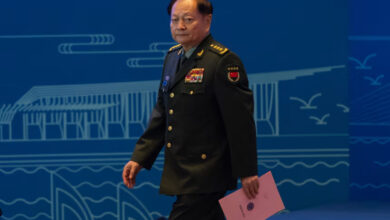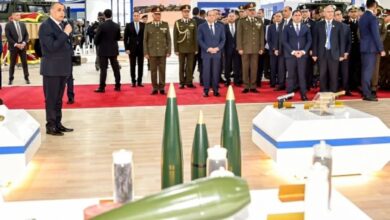Egypt is the first country since the Arab uprisings began in early 2011 to face the challenge of a transition from military rule. By contrast, in the past two decades numerous Latin American countries have done so, and most successfully. The lessons learned from those experiences may, therefore, help Egyptian political figures presently seeking to renegotiate civil-military relations.
Since the SCAF is the political actor which has had the most power to shape negotiations over the military’s future role, its behavior and intentions are of paramount importance. From the outset it has been clear that at a minimum the SCAF has sought to prevent the military from being subjected to civilian control, politically and economically. It is equally clear that it has been clumsy in pursuing that objective. Frequent alterations of its own transition roadmap; contradictions and misrepresentations in its public pronouncements; brutal repression accompanied by half-hearted apologies and ludicrous self-justifications; unwillingness to cede even minimal power to its civilian allies, including those in the cabinets it has formed; and the counterproductive strategy of empowering Islamists to undercut secular reformers and revolutionaries, all suggest political ineptness.
Why has the SCAF been so clumsy? One answer is that it is led by old men who were trained in a hierarchical organization. As much as 40 or even 50 years older than the youths their troops are confronting in the streets, the generals of the SCAF, who lack political experience and skills, are out of touch with the country they seek to rule. Their erratic style seems to support this hypothesis. But it also supports another explanation, which is that the SCAF, and possibly the military more generally, is divided. The zigzag pattern of its actions in this view results from internal tensions and shifts in the balance of power in the SCAF, driven in part by disagreements within the broader officer corps.
Yet another interpretation is that the SCAF is increasingly driven by fear, so is overreacting, seeking to crush opponents rather than outmaneuver them. Its worries are not only that it is losing its grip on power, but that its actions have isolated it from supporters, both domestic and foreign, while creating powerful enemies who ultimately will seek revenge.
It is ironic that in the early spring SCAF head Hussein Tantawi is rumored to have ordered that the 1982 Turkish constitution, imposed by the military following its 1980 coup, be translated into Arabic and serve as a guide for Egypt’s constitution drafters. If so, Tantawi must now have some second thoughts. The very Turkish general who issued that constitution and promoted himself to the presidency, Kenan Evren, was this month referred for trial for “crimes against the state.” His successor chief of staff, General Ilker Basbug, is now languishing in prison, charged with conspiring to overthrow the Justice and Development Party (AKP) government. Given that the Muslim Brotherhood is openly professing its admiration for the AKP and intent to model itself on the party, generals in the SCAF must have at least some concerns that Egypt's implementation of the “Turkish model” will result not in the military maintaining power, but in sharing the fate of generals Evren and Basbug.
Whatever the explanation of its behavior, the SCAF has since November street clashes become more intransigent and brutal, while taking ever greater risks. The December raids on NGOs, followed by Tantawi's false statements to the US defense secretary, as well as a slanderous press campaign alleging that the US government is urging Gulf Cooperation Council states not to provide financial support to Egypt, seems to suggest that the SCAF is biting the hand that feeds.
One interpretation of this provocative strategy is that the SCAF has begun to pursue a “Sampson Option.” Stirring up Uncle Sam and manipulating public opinion against the US and its alleged Egyptian running dogs, can be interpreted as the SCAF trying to position itself as the perceived defender of the nation. The message they are sending is that if the SCAF does not defend Egypt, it will collapse. Egyptians have only one choice then: rally behind the SCAF or be considered traitors.
But whether the SCAF is truly serious about implementing the Sampson Option, or is simply using it as a bargaining strategy by which it hopes to enhance its position in the political struggle to come with the Brotherhood and others, is not clear. And since this is now the nub of the transition issue, it is worth turning to Latin America to see how political actors there, especially generals, have behaved in similar circumstances.
There are of course, many “lessons” from Latin America, depending on the country. The overall pattern in most countries, including Argentina, Brazil, Chile, Ecuador, Peru and Uruguay was a transition from military rule to democratically elected civilians, with the military under civilian control. Perhaps the most relevant cases are Brazil and Chile. The former saw five different generals as president over a period of 21 years (1964–1985), and the repression was not great. In the latter, General Augusto Pinochet ruled almost single-handedly between the coup in 1973 and the first democratic election in 1989, and the level of repression was very high.
Looking back from the vantage point of 2012, there are a number of common features in these two democratic transitions. First, they were negotiated by emerging political figures to provide a set of conditions or “understandings” whereby the military could feel safe from retribution after they had surrendered political power. Second, radicalization was intentionally avoided by these political figures so the military did not have a justification to reclaim political power. Third, gradually the political institutions, including the role and position of the military, evolved to become increasingly democratic and representative. Fourth, the process of democratic consolidation, in which democracy becomes “the only game in town,” continues as a “work in progress” in both countries.
In short, these were conservative and controlled transitions, in which the military enjoyed, for a time, a number of guarantees, and they took a very long time. The guarantees in the case of Chile were ultimately renegotiated between civilians and the military so that those who most egregiously violated human rights during the military dictatorship were prosecuted. As was the case in virtually all post-Cold War democratic transitions, the role of foreign actors, be it the United States or the European Union, was minimal.
The main lessons learned from the Latin American cases then is that transitions, and subsequent consolidation, are likely to be protracted and gradual. The “safety” of officers once they have surrendered political power depends on whether there is broad acceptance of the exit conditions they have negotiated.
The implications for the SCAF are that though it is unlikely to be rapidly forced from power, the military upon which its power rests will gradually be brought under civilian control. As for guarantees against future prosecutions for crimes committed while in power, the generals of the SCAF would be advised not to cut a deal solely with the Brotherhood. Such an agreement would likely not be honored by other political actors, who in the future may well exercise power and seek retribution, as they have done in Chile.
Robert Springborg is professor at the Naval Postgraduate School. He is an historian and author and has written extensively on Egypt's military and the Mubarak regime. Thomas Bruneau is a distinguished professor at the Naval Postgraduate School and his research interests include Latin American and Iberian security.
The views expressed by the authors are their own and do not necessarily reflect those of the US Department of Defense.




